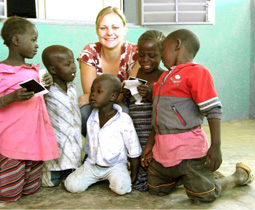Fogarty scholar Breanna Barger performs research, runs charity
March - April, 2009 | Volume 8, Issue 2
 Children outside the pediatric clinic in Kolle, Mali,
Children outside the pediatric clinic in Kolle, Mali,
examine the Polaroid pictures taken of them by
Fogarty Scholar Breanna Barger.In August of 2007, Breanna Barger began living out her high school dream of making a difference in health by setting out for Mali as a Fogarty International Clinical Research Scholar planning to work on malaria studies.
Working in the pediatric emergency room at Gabriel Touré National Hospital in the capital city of Bamako near the end of her stay, "I saw patients die because their families could not afford simple antibiotics, and I knew I had to do something."
So the University of Washington medical student started her own relief fund, at first paying for drugs out of her own pocket, then e-mailing home for some donations from friends and family.
"There was an outpouring of support," she recalls. "In a week I got about $5,000." In Mali—where the per capital annual income is $460 and about half the population is under 14— it went a long way.
Her father raised some money at work, friends sent donations and Breanna got the Montana-based Jeanette Rankin Peace Center to assume the administrative responsibilities of her newly christened Mali Relief Fund so that donors could take tax deductions. This spring she sent another pitch when friends and family were getting tax refunds they might donate.
"People are amazed at how little it takes to make a substantial impact," she says, citing the $25 it takes to treat a child with pneumonia in a hospital for a week, or the $250 it cost for surgical amputation, two weeks of hospitalization and prosthesis for a boy whose leg was crushed in an accident.
Her first assignment in Mali, a landlocked African country with a rich culture but some of the world's worst poverty, was at a tiny clinic in the town of Kolle, where the routine tests were processed in a lab powered by a generator. It was there she conducted a clinical trial that produced a significant finding that intermittent preventive treatment with artemisinin-based drugs reduced febrile malaria in schoolchildren by up to two-thirds compared to those receiving standard Vitamin C therapy.
Although she speaks French, the country's official language, and had been to Mali three years earlier as part of a National Institute of Mental Health research team studying schizophrenia in pre-industrial populations, Breanna did not list it as her preferred site when applying to the Fogarty program. "They kind of chose me," she laughs.
Growing up on the Flathead Reservation in the northwestern Montana town of Arlee, Breanna saw the kind of poverty that played a part in her career choice of helping people in need.
"Fogarty gave me a chance to do what I always wanted to," she says. 'This is so much more of what I thought medicine would be about than what you actually do in the United States."
Now engaged to a Malian, she plans to return to the country for research after her pediatrics residency at Johns Hopkins but maintain a home in the United States.
The Mali Medical Fund, however, is going to require sustainability of its own while Breanna finishes her medical training, and her former colleagues at Gabriel Touré are trying to pick up the slack. She hopes to make her charity independent eventually, even as she embarks on a career in malaria research.
"This is the kind of work I hope to continue doing. I find it very rewarding and I have a lot more energy for it than other things."
Learn more about the Mali Medical Relief Fund.
To view Adobe PDF files,
download current, free accessible plug-ins from Adobe's website.